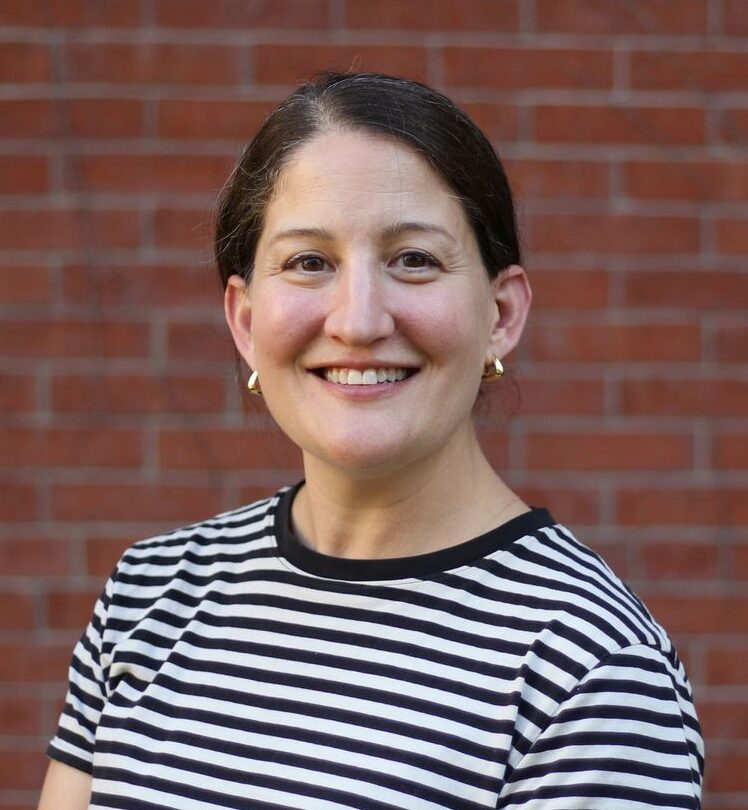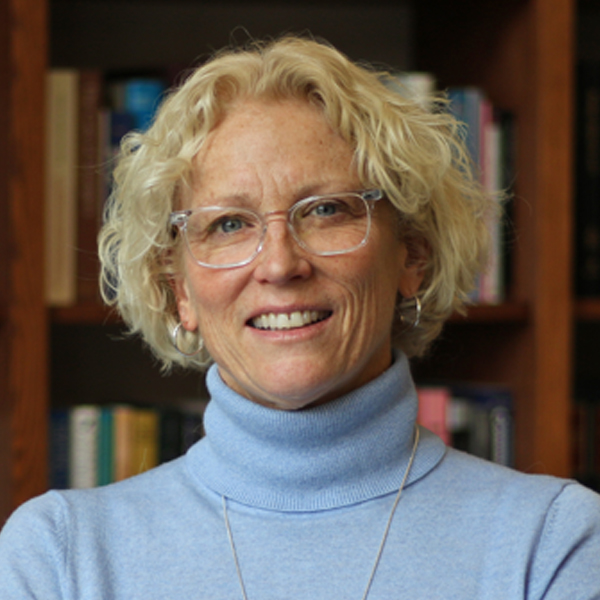Videos
Speakers

Emily Goldmann
Clinical Associate Professor, BUSPH Department of Epidemiology
Emily Goldmann is a psychiatric epidemiologist and Clinical Associate Professor in the Department of Epidemiology at Boston University School of Public Health. She also serves as the director of the online MPH program.
Dr Goldmann received her MPH and PhD in Epidemiology from the University of Michigan and served as a City Research Scientist at the New York City Department of Health and Mental Hygiene from 2010-2013. She has also conducted health economics outcomes research for a consulting firm. Prior to joining BU SPH in July 2024, she was a Clinical Associate Professor of Epidemiology at New York University School of Global Public Health for almost a decade.
Dr Goldmann’s research focuses on the social determinants of common mental disorders, population mental health surveillance, and physical-mental health comorbidity. She is also interested in the development of pedagogical approaches for teaching epidemiology and public health to diverse audiences. Previous work has centered on the role of neighborhoods, socioeconomic status and social support in posttraumatic stress disorder in urban areas, and the mental health consequences of disasters and other potentially traumatic events.

Viviana Horigian
Vice Chair for Education, University of Miami Miller School of Medicine Department of Public Health Sciences; Executive Director of the Florida Node Alliance of the National Drug Abuse Treatment Clinical Trials Network (CTN)
Viviana E. Horigian, MD, MHA, is a professor and educator in the Department of Public Health Sciences at the University of Miami Miller School of Medicine. She currently holds the position of Vice Chair for Education. Her previous roles include Director for Public Health Education, Director of the Americas Initiative for Public Health Innovation, and program director for the Master in Public Health and Master in Science in Public Health programs.
Dr. Horigian is also the Executive Director of the Florida Node Alliance of the National Drug Abuse Treatment Clinical Trials Network (CTN) housed at the University of Miami. The Florida Node Alliance is a partnership between scientists and program leaders at the University of Miami with scientists and practice leaders from community treatment agencies located in Florida, Georgia, and Puerto Rico. As partners, scientists and practitioners design, implement, and train in interventions for alcohol and drug abuse treatment.
Dr. Horigian’s career has been committed to improving practice through the implementation of clinical trials in real-world settings, and in creating the local capacities that would allow the implementation of such trials. She was the Principal Investigator of a technology transfer project that aimed to develop the research infrastructure for the implementation of rigorous randomized clinical trials in Mexico. In this role, she mentored investigators from the National Institute of Psychiatry in Mexico on the design, implementation, safety, and interpretation of the results of RCTs in real-world treatment settings. She has used the same methodology for technology transfer to develop research capacity in Ecuador and Chile. Due to her international leadership, she was honored with the 2015 National Institute on Drug Abuse (NIDA) International Program Award of Excellence.
Together with Drs Daniel Feaster and Sannisha Dale, she directs the CHANGE training program, an interdisciplinary, innovative, and timely approach to train the next generation of HIV behavioral scientists with skills to address persistent health disparities in HIV treatment and prevention in Black, Latinx, and LGBTQ communities.
She has served in the Scholarship of Teaching and Learning Teaching Task Force for the Association of Schools and Programs of Public Health (ASPPH) and represents the Miller School of Medicine in Academic Affairs of ASPPH. She has also been an advisory council member for the Hispanic and Latino Addiction Technology Transfer Center and the National Latino Behavioral Association.

Laura Magaña
President and CEO, ASPPH
Dr. Laura Magaña is a globally recognized academic public health leader known for her commitment to transformation, innovation, and social justice. She serves as President and CEO of the Association of Schools and Programs of Public Health (ASPPH), representing more than 150 academic institutions dedicated to advancing public health. Additionally, she is the founding President of the Global Network for Academic Public Health (GNAPH), an alliance of seven regional associations that support public health education worldwide.
Under Dr. Magaña’s leadership, ASPPH has strengthened its role as a catalyst for excellence and innovation across education, research, and practice in academic public health. She has overseen the launch of strategic initiatives, including the Academic Public Health Leadership Institute, the ASPPH Workforce Development Center, and a robust advocacy platform that elevates the voice of academic public health in key policy arenas. She has also expanded the association’s global reach and membership, positioning ASPPH as a central force in shaping the future of public health education.
Dr. Magaña is leading ASPPH’s Vision 2030 agenda, which addresses critical public health challenges through initiatives focused on Dismantling Racism in Academic Public Health, Climate Change and Health, Framing the Future 2030, Gun Violence Prevention, Healthy Longevity, and the Integration of Artificial Intelligence in Public Health.
Before joining ASPPH, Dr. Magaña spent over 35 years transforming public and private universities in Mexico and leading educational, multilateral, and nonprofit organizations across the United States, Central America, and Europe. Most recently, she served as dean of the School of Public Health at the National Institute of Public Health in Mexico.
A prolific scholar, Dr. Magaña has authored over 90 academic publications, with a focus on learning environments, educational technology, and the advancement of public health education globally.

Michael Stein
Dean ad interim, BUSPH
Recognized among the top one percent of NIH grant recipients over the past two decades, Dr. Stein has worked at the intersection of behavioral medicine and primary care. His outcomes research has moved between substance use disorders and HIV/AIDS, sleep and pain, mental health disorders, and the determinants of risk-taking. He has published more than 450 scientific journal articles. Dr. Stein graduated from Harvard College and received his medical degree from Columbia College of Physicians & Surgeons. After medical residency at New England Medical Center, he completed a National Research Service Award Fellowship at Brown University. He was director of HIV Services at Rhode Island Hospital for two decades. He worked for years as a consultant to tech start-ups. He is also the award-winning author of six novels and eight books of non-fiction, and his writings have been noted in the Best American essay series, and appeared in many magazines and newspapers. Recent books, “Me vs. Us: A Health Divided” and “Accidental Kindness: A Doctor’s Notes on Empathy,” were published in 2022. HIs newest book, with Sandro Galea, “The Turning Point: Reflections on a Pandemic” was published in 2024. He is Executive Editor of the online magazine Public Health Post.

Lisa Sullivan
Associate Dean for Education, BUSPH
Lisa Sullivan is the Associate Dean for Education at the School of Public Health. She has a PhD in Statistics and is Professor of Biostatistics and former Chair of the Department of Biostatistics. She teaches Biostatistics and Quantitative Methods for Public Health and was instrumental in developing a minor program in public health which is open to undergraduate students at Boston University. She served as Principal Investigator of the Summer Institute for Training in Biostatistics from 2003-2015, which was designed to promote interest in the field of biostatistics and its many exciting career opportunities. Lisa is co-author of a textbook entitled Introductory Applied Biostatistics, author of Essentials of Biostatistics in Public Health (currently in its third edition) and Editor-in-Chief of the Encyclopedia of Clinical Trials. She is the recipient of numerous teaching awards for excellence in teaching, including the Association for Schools of Public Health/Pfizer Award for Teaching Excellence. Lisa is a senior statistician on the Framingham Heart Study working primarily in developing and disseminating cardiovascular risk functions. She has expertise in multidisciplinary research projects including a variety of projects in cardiovascular disease, a large epidemiological study to assess the association between alcohol exposure in pregnancy and sudden infant death syndrome (SIDS), studies to improve methods for prenatal diagnosis and a clinical trial to improve repetitive behaviors in children affected with autism.
